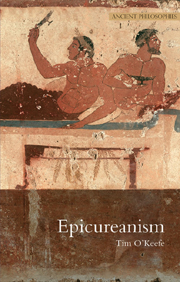Book contents
- Frontmatter
- Contents
- Preface
- Acknowledgements
- Sources and abbreviations
- Chronology
- 1 Introduction: the life of Epicurus and the history of Epicureanism
- I Metaphysics and physics: introduction and overview
- II Epistemology: introduction and overview
- 9 Scepticism
- 10 The canon
- III Ethics: introduction and overview
- Glossary of terms
- Notes
- Further reading
- Bibliography
- Index
9 - Scepticism
from II - Epistemology: introduction and overview
- Frontmatter
- Contents
- Preface
- Acknowledgements
- Sources and abbreviations
- Chronology
- 1 Introduction: the life of Epicurus and the history of Epicureanism
- I Metaphysics and physics: introduction and overview
- II Epistemology: introduction and overview
- 9 Scepticism
- 10 The canon
- III Ethics: introduction and overview
- Glossary of terms
- Notes
- Further reading
- Bibliography
- Index
Summary
A pattern of argument ubiquitous in Epicureanism is to start from something evident in sensation and on its basis infer a conclusion about realities hidden from direct observation. So, for example, Epicurus takes the obvious phenomenon of bodily motion to establish the existence of unobservable void. But predecessors of Epicurus such as Parmenides and Democritus, and successors of his, such as the Academic and Pyrrhonian Sceptics, marshalled powerful arguments against the reliability of the senses.
The Epicureans think that such a sceptical view of the senses is untenable. Before we look in Chapter 10 at the Epicureans' positive epistemology, we shall first examine their anti-sceptical arguments. That is because one of the primary Epicurean strategies for supporting their positive epistemology is to try to show that all other alternatives to their own views have untenable sceptical consequences. The Epicureans give three major anti-sceptical arguments. The first is that scepticism is self-refuting. The second is that the sceptic (qua sceptic) cannot have knowledge of the concepts needed to formulate the sceptical position. The third is that scepticism is unlivable.
Unfortunately, we do not have any extended Epicurean expositions of these arguments. However, Lucretius does briefly state each (DRN IV 469–99, IG I–27, LS 16A). Epicurus himself probably formulated these arguments against philosophers such as Parmenides and Democritus, who cast doubt on whether the senses were reliable.
- Type
- Chapter
- Information
- Epicureanism , pp. 87 - 96Publisher: Acumen PublishingPrint publication year: 2009



